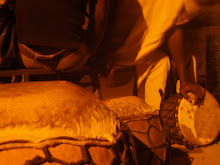If someone were to go into my apartment right now they might very well think I saw the coup coming. There are two large wash basins and a bucket full of water, a small case of medicine, and a several month supply of toiletries in my bathroom alone. But the fact is that I’m just a Peace Corps volunteer who has stocked up and has such little water pressure that I have been keeping all that water for about a month now, so that I don’t have to plan my bucket baths an hour ahead of time. The fact is that this coup blindsided me.
By nearly all accounts, Mali has been a shining example of democracy in West Africa. During my first two years we took evacuees from three other countries, confident that Mali would be a safe haven even if neighboring countries were dealing with unrest. Perhaps I should have taken the conflict in the north more seriously. A co-worker who is ethnically northern certainly did. When the reaction in Bamako became violent for a short period last month he expressed worry about himself, his family, and me. Thousands of people fled to neighboring countries, even Niger which has had its own grave problems recently. I, on the other hand, was confident that Peace Corps would make sure I remained safe and that the actions would be over soon, and my confidence proved to be accurate. I did, however, express my concern over what would happen here in the following months. There was a volatile situation brewing: the worst rainy season I had seen in my time here had caused a serious food shortage nationwide; the Arab spring, and more specifically the fall of Khadafi in Libya, had led to an influx of soldiers and weapons into Mali, thus triggering another uprising in the north; and there was scheduled to be an election in April. People had already started to move into the cities as their stockpiles of grain in village ran out, months ahead of previous years. I also don’t know if I was just more aware, living in Bamako, but it seemed as if crime had gone up here, too.
Earlier this week I was going about my life as normal. On Tuesday night I was driving back into Bamako with co-workers after a couple of days doing work in the field. We were supposed to return Wednesday but had finished a day early, so I had cancelled my French lesson for that afternoon. Since I didn’t have the lesson I had planned on going into the Grande Marche/Suguba, but then got caught up in cleaning my apartment instead. I had the music cranked up and wasn’t aware of anything going on outside until mid-afternoon when Peace Corps contacted me and let me know I should stay inside until further notice. The first noises I heard suggesting things weren’t totally normal sounded like the popping of firecrackers, and it was only at about ten o’clock that night that the gunfire became constant. At that point in time, I later learned, there wasn’t even fighting anymore, but firing the guns into the air in celebration and also to clear the streets. I fell asleep several hours later, with intermittent gunfire still going in the background. When I woke up at about 9 the next morning, later than I’d slept in months, everything had calmed down again, but I knew things weren’t normal. The sounds of children playing in the streets weren’t loud enough, and I didn’t smell the lady frying and selling furufuru below my window. After talking with Peace Corps, I headed across the street to the home of one of our staff members, Jolie, and was able to speak with her and get online to feel more like I knew what was going on. Now Thursday has bled into Friday and Saturday and I still feel about the same as I did then: confused, sad, and a little angry.
Why? Why did they choose now for a mutiny and coup d’état? There was supposed to be an election in a month! Who is going to be in charge now? How long will it take for things to return to something resembling normalcy? Will the country I hadn’t even heard of 5 years ago, but has now become a part of me, recover? Mali has been the happy recipient of international aid over the last 50 years, but has now lost an incredible amount of legitimacy. With the US, France, and other big donors talking about pulling funding I wonder what will happen. Probably even more significant is the root cause of the mutiny: the fighting in the north. The rebel fighters have taken advantage of the chaos in the capital to gain ground. Will the new ‘government,’ whenever it does take hold, be able to respond? I don’t know the answers to any of these questions.
What I do know is this: I love Mali, despite of, perhaps because of, all its flaws. It has been my home for three years and I’m not ready to leave yet. Not like this. So I hope, I pray, that the situation here will be peacefully resolved as quickly as it can, as long as it is in the best interest of the Malian people.
Inchallah.
Subscribe to:
Post Comments (Atom)

2 comments:
Thank you for writing your thoughts and reflections.
Hi, it's Lonnie's (your grandma) neighbor of all people. It is fascinating to read about your travels. Life is kinda boring here. Thanks for sharing.
Post a Comment